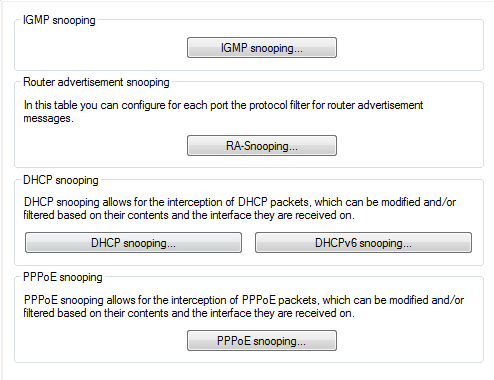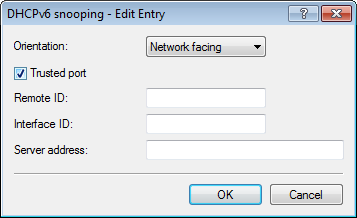Unlike a DHCPv6 relay agent, which has the full IPv6 features (such as ICMPv6) and can route data packets on the network (layer 3), a lightweight DHCPv6 relay agent as per RFC 6221 enables only the creation and forwarding of relay-agent information between DHCPv6 clients and DHCPv6 servers (layer 2).
In contrast to DHCPv4 snooping, the LDRA does not simply append the DHCPv6 packets with information about the relay agent: Instead, it packs the message from the client into a separate option, prepends its own relay-agent header and then forwards this DCHPv6 packet with its supplementary information to the DHCPv6 server (relay forward message).
The DHCPv6 server evaluates this data packet and sends a similarly packaged response to the relay agent. This then extracts the message and sends it to the requesting client (relay-reply message).
In LANconfig you can set up DHCPv6 snooping for each interface under and a click on DHCPv6 snooping.

After selecting the appropriate interface, you can set the following:

- Orientation
- This is where you enable or disable DHCPv6 snooping. The following options are possible:
- Network-facing: The LDRA uses this interface to communicate with a DHCPv6 server.
- Client-facing: The LDRA uses this interface to communicate with DHCPv6 clients connected to the network.
- Trusted port
- With this option enabled, the LDRA forwards DHCP requests from clients and also DHCP responses from DHCP servers. If this interface is classified as not trusted, the LDRA discards DHCPv6 requests to this interface. Similarly, the LDRA does not forward DHCPv6 responses with the wrong interface ID to the client.
- Remote ID
- According to RFC 4649, the remote ID uniquely identifies the client making a DHCPv6 request.
- Interface ID
- The interface ID uniquely identifies the interface used by a client to make a DHCPv6 request.
- Server address
- You can set the IPv6 address of a DHCPv6 server here.
Note: Leave this field blank if you want to receive responses from all DHCPv6 servers on the network. Otherwise the LDRA reacts only to DHCPv6 responses from the server you have specified. In this case, the LDRA discards responses from other DHCPv6 servers.
You can use the following variables for Remote ID and Interface ID:
- %%: Inserts a percent sign.
- %c: Inserts the MAC address of the interface where the relay agent received the DHCP request. If a WLAN-SSID is involved, then this is the corresponding BSSID.
- %i: Inserts the name of the interface where the relay agent received the DHCP request.
- %n: Inserts the name of the DHCP relay agent as specified under .
- %v: Inserts the VLAN ID of the DHCP request packet. This VLAN ID is sourced either from the VLAN header of the DHCP packet or from the VLAN ID mapping for this interface.
- %p: Inserts the name of the Ethernet interface that received the DHCP packet. This variable is useful for devices featuring an Ethernet switch or Ethernet mapper, because they can map multiple physical interfaces to a single logical interface. For other devices, %p and %i are identical.
- %s: Inserts the WLAN SSID if the DHCP packet originates from a WLAN client. For other clients, this variable contains an empty string.
- %e: Inserts the serial number of the relay agent, to be found for example under .
